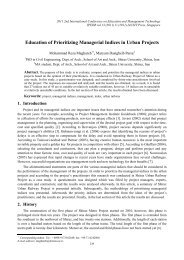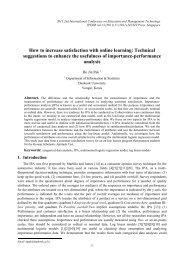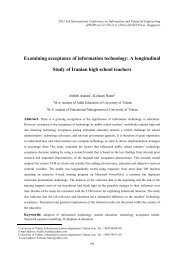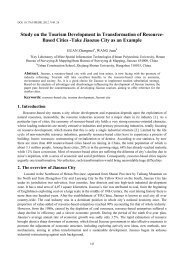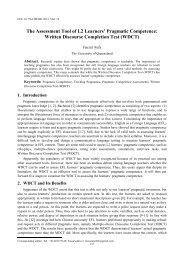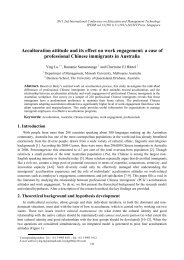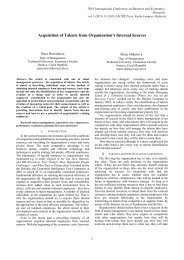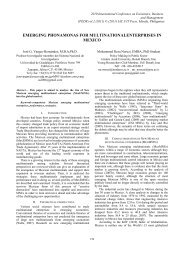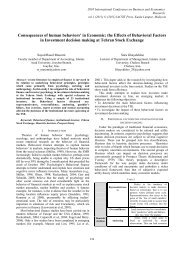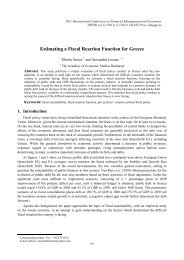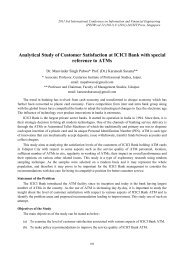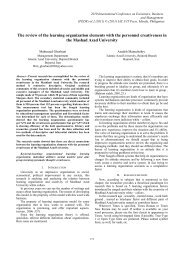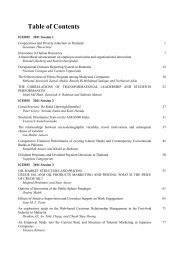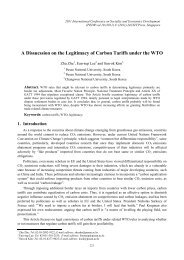Model of Personality: Elements of Psychology - ipedr
Model of Personality: Elements of Psychology - ipedr
Model of Personality: Elements of Psychology - ipedr
Create successful ePaper yourself
Turn your PDF publications into a flip-book with our unique Google optimized e-Paper software.
learnt entity, and backed up with the basic logic system which forms the core <strong>of</strong> the person that defines him<br />
and forms his conscience. This emotionally tagged concepts form into (h) part <strong>of</strong> him where the emotions<br />
would be over-whelming.<br />
Now, for suppose a concept in (h) start facing resistance or the mistakes in the concept are conformed,<br />
causes inconvenience and lot <strong>of</strong> bad-feeling in person, then he learns to repress the emotion related to it and<br />
in process the back-up for the concept from (h) logic is withdrawn. As such , the concept gets externalised<br />
and so, emotion related wud cut from it.This process is called "externalisation". So, as such 2 forms <strong>of</strong><br />
acceptance levels form in a person, namely (m) and (h) parts.And this entity <strong>of</strong> externalisation forms main<br />
basis for Cognitive Therapy.<br />
Acceptance:- Acceptance <strong>of</strong> anything (an action or a person) forms in 2 ways,<br />
• acceptance by first time exposure and<br />
• acceptance by repetition.<br />
When a person is exposed to an action for first-time, the inhibitions to it areremoved(.Eg-burping in<br />
public). And when he practises an act repeatedly and nocomplains arise, then too it gets acceptance (Eg-<br />
Smocking which cause problem at firsttime but person gradually habituates to it).As such habits are formed.<br />
Automations:- The automated responses <strong>of</strong> behaviour when person is confronted in asituation are<br />
automations. They are either to facilitate for a drive or a derivative <strong>of</strong> a drive, intension or a passion.<br />
1.5. General Humanitarian<br />
Consideration <strong>of</strong> a person towards other person forms into General Humanitarian. It do say about the<br />
approaches and treatment <strong>of</strong> this person towards others.<br />
Socialising:- Humans depend upon each other for realisation <strong>of</strong> their needs and this gives way for the<br />
entity <strong>of</strong> socialising. The person starts forming bonds with others egoistically. So, this entity is responsible<br />
for social structure and civilisations.<br />
Acceptance:-A person wants to be felt needed by others and this gives way to entity acceptance. Here,<br />
Ego and Habituation elements contribute much for this entity and this is responsible for Group-formations<br />
THEORY OF NUMBERS:- A person tends to form group to reduce insecurities and increase safety<br />
perception i.e. perceives 'Group = Strength. This leads to Theory <strong>of</strong> numbers.While present in group, person<br />
feels soothed and confident. And in reverse situation, when the person is alon,he feels apprehension and<br />
insecure..<br />
1.6. Present-Living<br />
A person is connected to his environment and activities around are percieved, they stimulate thoughts<br />
and emotions related; and give out the response in a person.This occurs in a conscious state and through a<br />
centre called Conscious Centre. Always a traffic <strong>of</strong> impulses from different areas is present to Conscious<br />
Centre. In situations, many analyses regarding aspects in situation are made out from different areas in mind<br />
and out <strong>of</strong> all relevant impulses, the strong one i.e. more remote in conscience or much support from reason,<br />
is considered by Conscious Centre and given out as a decision. This helps in problem-solving, decisionmaking,<br />
expressing opinions or making out a point. For this a centre Decision-Centre is present in Conscious<br />
Centre.And also Conscious Centre would have a feed-back system on behaviour.And the impulse traffic<br />
from different areas <strong>of</strong> mind creates trains <strong>of</strong> thoughts in person and depending on the long-term memory<br />
train, he goes into past-living, future-living(day-dreaming) or meditative forms. And as such different moods<br />
are created in person at various situations and persist in him.<br />
Depending upon the time extent <strong>of</strong> persistence <strong>of</strong> a mood along with or without the concept gives 4<br />
levels <strong>of</strong> responses in him, a very short-term "spurt" level varying from minutes to hours, a medium "micro"<br />
level persisting for hours , a long one <strong>of</strong> "macro" level persisting for days and when all <strong>of</strong> them are combined<br />
if bring about a change in the person's behaviour, would count into "whole" level which varies from 1year to<br />
maximum 7 years.<br />
So, when a concept is vigorously learned repeatedly and pondered in macro-level, an 'angle <strong>of</strong> view'<br />
facilitating to the concept in consideration is formed. So, person focuses on the particular concept and goes<br />
92



